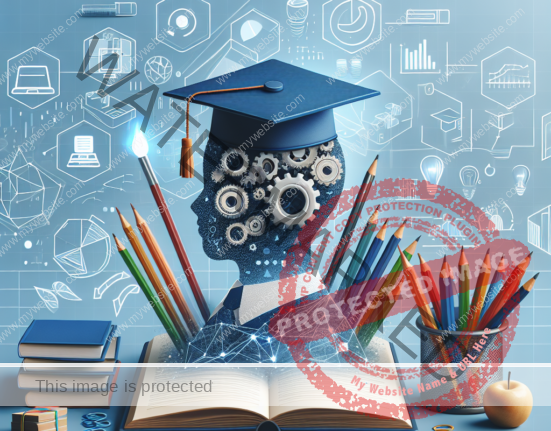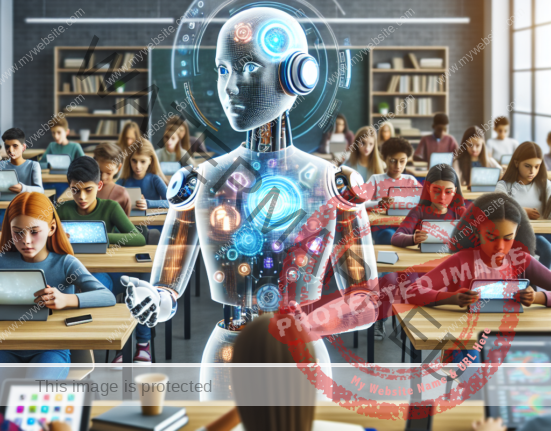AI: Revolutionizing Personalized Online Education
In the realm of online education, Artificial Intelligence (AI) is making significant strides in personalizing the learning experience. This technological advancement is reshaping how students engage with educational content on an individual level.
Opportunities Unleashed
AI in online education offers exciting prospects by tailoring learning experiences to suit each student. With the help of AI algorithms analyzing extensive data, educational platforms can now adapt to the learning styles and preferences of individual learners. This personalized approach ensures that students are consistently engaged with material at an appropriate level, promoting deeper comprehension.
Real-time feedback and assessment are transforming the educational landscape thanks to AI. Instead of periodic evaluations, AI systems can continuously monitor student progress and provide immediate feedback. This rapid response helps students correct errors promptly and reinforces learning concepts efficiently.
Enhanced student engagement is a standout benefit of AI in education. By incorporating interactive elements and gamification, AI makes the learning process more dynamic and captivating. This interactive approach keeps students motivated and immersed in their studies, which is crucial for effective retention of knowledge.
AI provides valuable data-driven insights for educators to enhance teaching methodologies. By analyzing student data, AI can reveal patterns and trends that human instructors might overlook. This information empowers educators to make informed decisions regarding curriculum design, teaching approaches, and intervention strategies, ultimately leading to improved student outcomes.
Challenges to Overcome
Despite the immense opportunities AI presents in education, there are notable challenges to address. Data privacy and security are critical concerns when handling vast amounts of student data. Educational institutions must implement robust measures to protect student information from unauthorized access and breaches.
Addressing bias in AI algorithms is another crucial issue. Biased or unrepresentative training data can perpetuate existing biases within the system, affecting student assessments and learning outcomes. Developers must actively work to create unbiased AI systems by utilizing diverse datasets and continuously monitoring and refining algorithms.
Equity and access are paramount considerations in implementing AI in education. While AI has the potential to democratize education, not all students have equal access to the technology required for personalized learning. Closing the digital divide to ensure all students can benefit from AI-driven education, regardless of their background, is essential.
Effective integration of AI tools in online education relies on teacher training and acceptance. Educators require support and training to successfully incorporate AI-driven personalized learning into their teaching practices. Addressing concerns about job displacement and relinquishing control in the teaching process can facilitate the smooth adoption of new technologies in education.
The Future of AI in Personalized Online Education
With advancements in Natural Language Processing (NLP) and Machine Learning, the future of AI in personalized online education looks promising. These technological developments will enhance AI’s responsiveness to student needs and provide context-aware feedback, thereby elevating the learning experience.
Integrating AI with technologies like Virtual Reality (VR) and Augmented Reality (AR) will create engaging and immersive learning environments. These advancements enable students to apply theoretical knowledge in practical scenarios, enriching the learning process.
AI’s potential to facilitate lifelong learning is another exciting prospect. Personalized AI-driven learning platforms can support continuous upskilling and reskilling by offering customized learning paths aligned with individual career goals and skill gaps. This adaptability ensures learners can stay relevant in an ever-evolving world.
In Conclusion
In conclusion, the role of AI in personalized online education presents vast opportunities for reshaping the educational landscape. By tackling challenges related to data privacy, algorithmic bias, equity, and teacher training, we can harness the potential of AI to create a more inclusive, engaging, and effective learning environment.
As eLearning developers, embracing innovation while upholding ethical and equitable practices in education is crucial. Responsible utilization of AI’s capabilities can pave the way for an educational future that benefits both learners and educators.
For further reading on this topic, you can refer to the source AI In Personalized Online Education: Opportunities And Challenges.















